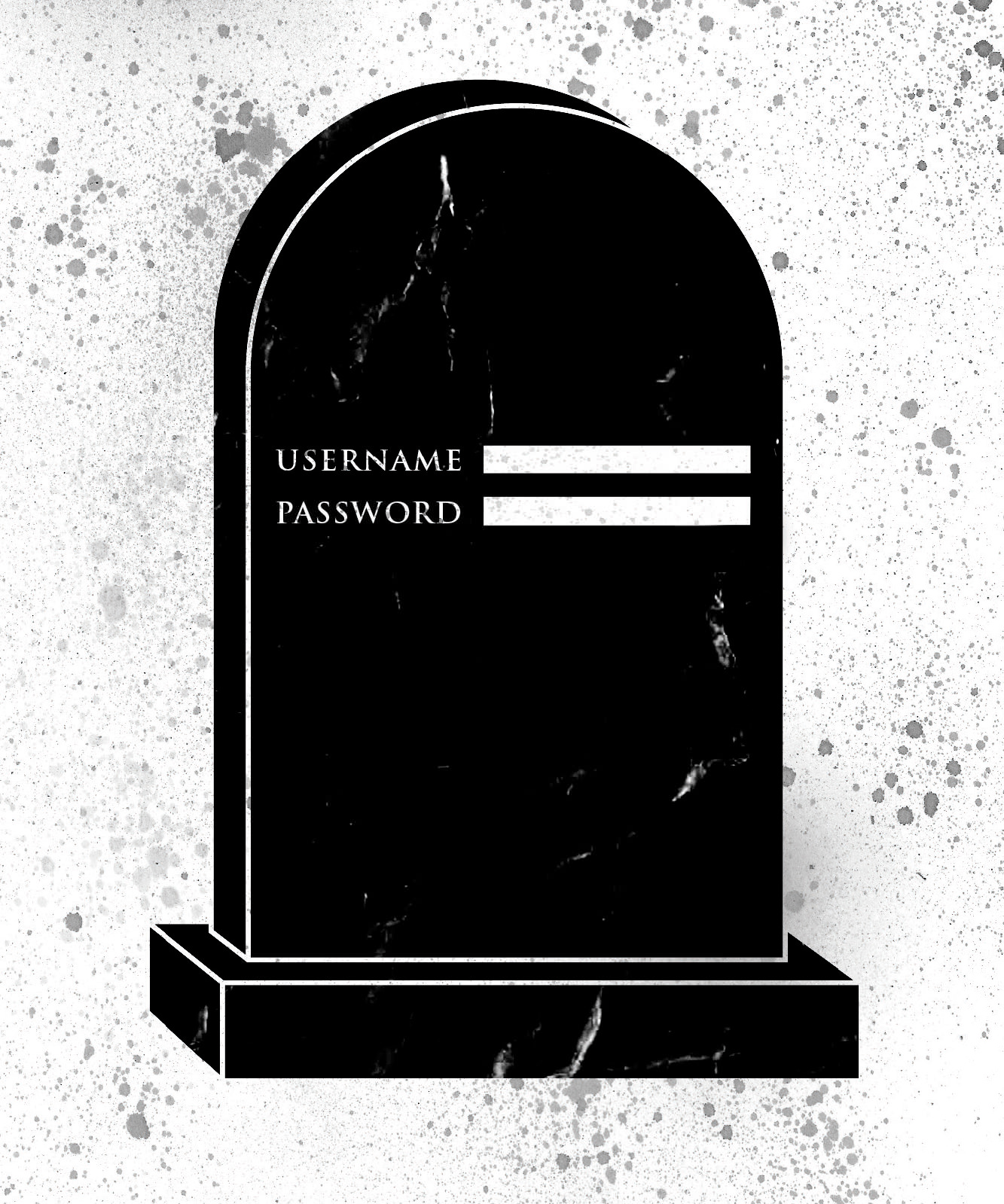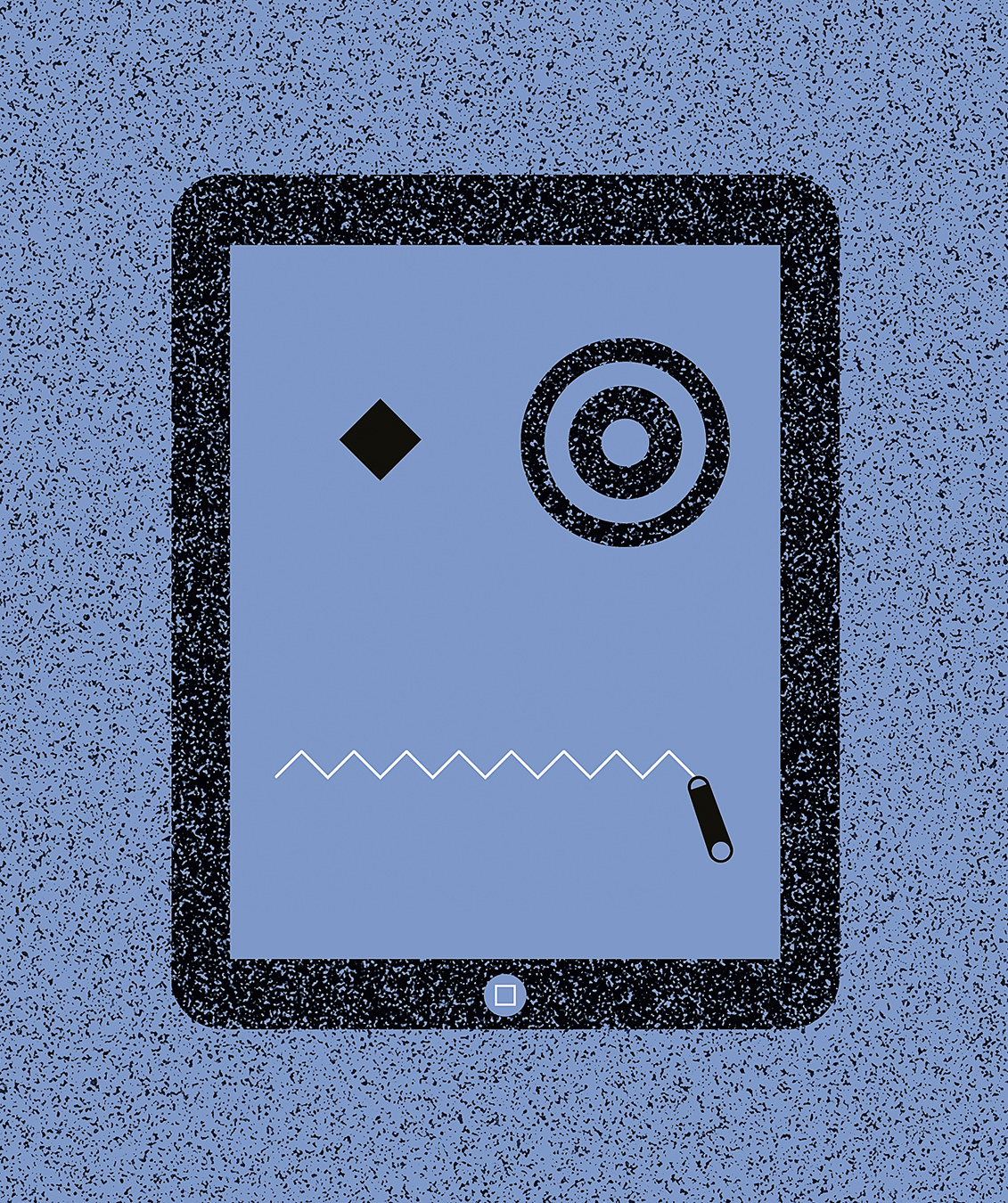Data After Death
What happens to your digital remains?

Illustration by Mark Reynolds.
Derek Miller is dead, to begin with. There is no doubt whatever about that—because Miller himself told us. His final words, uploaded posthumously by a close friend on May 4, 2011, were both pithy and poignant: “Here it is. I’m dead, and this is the last post to my blog.” He was 41.
Of course, in the Internet age, “death” is a relative term. Although Miller’s body finally succumbed to the ravishes of the colorectal cancer he’d battled since 2007, his prose lives on. You can find it there, in its entirety, at Penmachine.com, along with any number of photos, podcasts, MP3s (Miller was an avid musician), and other relics from his too-short life.
To call Miller’s last words famous would be understating the point. Since his passing, Miller’s final post has been shared, forwarded, linked, posted, tweeted, and commented upon by literally millions of viewers. Such was the demand for Miller’s final post—the site registered more than 6,000 requests per minute and over eight million hits in total over the first 24 hours—that the blog’s server crashed repeatedly and site administrators had to switch Internet service providers. With everyone from Salon.com to CNN to the Otago Daily Times (one of New Zealand’s oldest broadsheets) continuing to cite and comment about his blog, it’s certain that Miller’s digital life will live on for quite some time.
And that brings up an important point. Over the years he was writing his blog, Miller thought a great deal about his so-called “digital remains”: the words, photos, passwords, personal details, and other bits and bytes that make up a digital life. Miller considered this a serious project, taking considerable care to organize and clean up his digital affairs prior to his passing. He also made things easy for his digital executor, making sure his blog entries would be easy to archive and his site easy to administer. Constructing some degree of immortality for his words clearly was part of Miller’s effort to share experience, create a legacy, and ultimately make meaning of a savage, unforgiving fate.
Obviously, the immediacy of Miller’s mortality drove the issue of digital remains to the forefront of his mind. The rest of us, however, haven’t gotten the message quite yet. As more and more of our lives are spent on the Internet, as our e-mails, tweets, and posts pile up like so much junk in some colossal online attic, how we assert personal control over our private information and digital identity in an increasingly public world may become the essential technological question of our age.
For the organizers of Digital Death Day (DDD), the issue is important right now. The purpose of the self-styled “unconference” held this past May at California’s Computer History Museum was to ask some of the hard questions that surround protecting one’s personal information in the Internet age. What exactly happens to your personal e-mails when you die? What standards exist for deleting or archiving one’s data after death? What are the criteria for declaring certain data private, and others public? And perhaps most important of all, who gets to decide which is which?
The short answer: nobody really knows. If the participant-generated notes from DDD’s various breakout sessions are any indication, the world still has some thinking to do when it comes to dealing with digital remains. While participants asked many questions, and raised no shortage of interesting topics, no broad-level consensus or agreements were formed. Clearly, it will be a while before there are torts, precedents, statutes, or even established professional practices covering the disposal of one’s digital assets.
In the meantime, Silicon Valley has come up with its own solution—sort of. Many Web 2.0 companies (Facebook, Twitter, Google, etc.) now have established protocols for the disposal of one’s personal data, or the release of it to one’s digital heirs. While there is some overlap between such policies, there are many differences as well. Facebook, for instance, offers the option for dealing with digital remains by allowing heirs to convert pages into an online memorial. Twitter offers assistance for those wanting to back up a user’s public tweets, and both networking sites allow heirs to also choose to delete a page in its entirety, or to do nothing at all. When it comes to Gmail and Hotmail, survivors can request access to a user’s account by providing proof that they are the lawful representative of the deceased’s estate, as well as producing a verified death certificate.
Until such time as agreement emerges, there are resourceful programmers and online entrepreneurs capable of taking care of such matters for you. Companies such as Legacy Locker, AssetLock, LifeEnsured, and Deathswitch offer online archiving services (some are free, while others are billed monthly, annually, or “for life”) for important documents, passwords, photos, and shopping credits. Think of it as your online safety deposit box, offering you a way to pass on important information and digital keepsakes to loved ones in a timely and efficient manner. Just as important, such companies also offer to delete and “close out” accounts, aliases, and online identities you might want to keep private for eternity. Either way, it seems a better option than letting corporate headquarters do it for you.
Miller’s blog is not exactly what one would call easy bedtime reading. And not everyone enjoyed it: more than one reader labelled Miller’s intimate chronicle as more a spectacle of suffering than an exploration of the mystery and wonder of life itself. “Some things in life and in death are just best kept to oneself … especially things that matter most,” one commenter mused. Perhaps he is right. But at least Derek Miller got to make that choice for himself. And that, at least partly, is the point.






